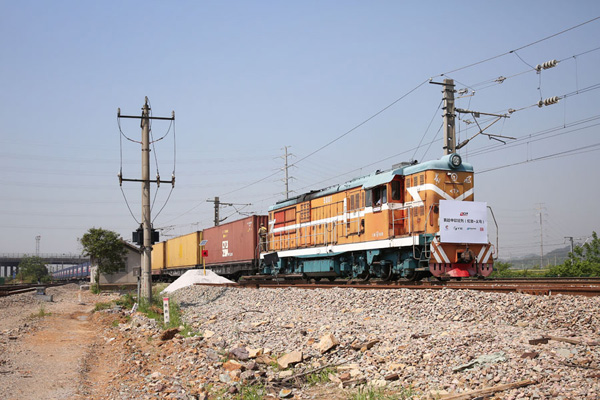


A freight train operating on the Yiwu-London rail line arrives back at Yiwu West Station in Yiwu, East China's Zhejiang province, April 29, 2017. (Photo/Xinhua)
The Belt and Road Forum for International Cooperation will promote ties through a platform of change and improvement, with more than 50 documents on infrastructure construction expected to be signed, officials with the nation's top economic regulator said on Wednesday.
"We do not want to turn the forum into a performance put on only by China. That is not our goal," said Ou Xiaoli, counsel of the Department of Western Region Development at the National Development and Reform Commission.
"Instead, China hopes to build a platform to enhance cooperation and address global problems," he said.
"We welcome everyone to participate," he added.
The forum will be held on Sunday and Monday in Beijing, where more than 1,500 leaders and experts are expected to participate, according to an agenda released by the commission.
By the end of 2016, more than 100 countries and regions had expressed a willingness to support the Belt and Road Initiative, which comprises the Silk Road Economic Belt and the 21st century Maritime Silk Road.
China has so far signed 46 cooperation agreements with 39 countries and regions to implement the initiative, according to the commission.
Ou said that discussions during the forum will focus on eight major areas: infrastructure construction, industrial investment, economic and trade cooperation, energy resources, financial cooperation, cultural exchange, ecological environment and maritime cooperation.
More than 50 cooperative documents to support infrastructure construction are expected to reach agreement during the forum, according to Fei Zhirong, head of Basic Industry Department under the commission.
"Priority for infrastructure construction will be given to fixing bottlenecks and missing links in the transportation network along the Belt and Road countries," he said.
The forum will help infrastructure projects overseas accelerate because it will provide financial institutions with opportunities to offer cofinancing, said Jin Qi, chairwoman of the Silk Road Fund, established in 2014 to focus on long-term investment of initiative related projects.
Humaid Kanji, an environmental economist in the United Arab Emirates, said more convenient transportation across continents will improve efficiency of large-scale regional economic and trade cooperation.
Kanji said building infrastructure projects is not a way for China to export excess capacity, because there is a huge gap in infrastructure constructions that cannot be filled in the short term.
"A more efficient and green transportation system will enhance regional connectivity and help resolve other key issues that the international community is grappling with, such as climate change," he said.
"Many countries touched by the initiative share similar ideas on tackling climate change. We hope to make good use of the initiative to enhance climate policy coordination with China and other countries along the initiative."
 Fire brigade in Shanghai holds group wedding
Fire brigade in Shanghai holds group wedding Tourists enjoy ice sculptures in Datan Town, north China
Tourists enjoy ice sculptures in Datan Town, north China Sunset scenery of Dayan Pagoda in Xi'an
Sunset scenery of Dayan Pagoda in Xi'an Tourists have fun at scenic spot in Nanlong Town, NW China
Tourists have fun at scenic spot in Nanlong Town, NW China Harbin attracts tourists by making best use of ice in winter
Harbin attracts tourists by making best use of ice in winter In pics: FIS Alpine Ski Women's World Cup Slalom
In pics: FIS Alpine Ski Women's World Cup Slalom Black-necked cranes rest at reservoir in Lhunzhub County, Lhasa
Black-necked cranes rest at reservoir in Lhunzhub County, Lhasa China's FAST telescope will be available to foreign scientists in April
China's FAST telescope will be available to foreign scientists in April "She power" plays indispensable role in poverty alleviation
"She power" plays indispensable role in poverty alleviation Top 10 world news events of People's Daily in 2020
Top 10 world news events of People's Daily in 2020 Top 10 China news events of People's Daily in 2020
Top 10 China news events of People's Daily in 2020 Top 10 media buzzwords of 2020
Top 10 media buzzwords of 2020 Year-ender:10 major tourism stories of 2020
Year-ender:10 major tourism stories of 2020 No interference in Venezuelan issues
No interference in Venezuelan issues
 Biz prepares for trade spat
Biz prepares for trade spat
 Broadcasting Continent
Broadcasting Continent Australia wins Chinese CEOs as US loses
Australia wins Chinese CEOs as US loses